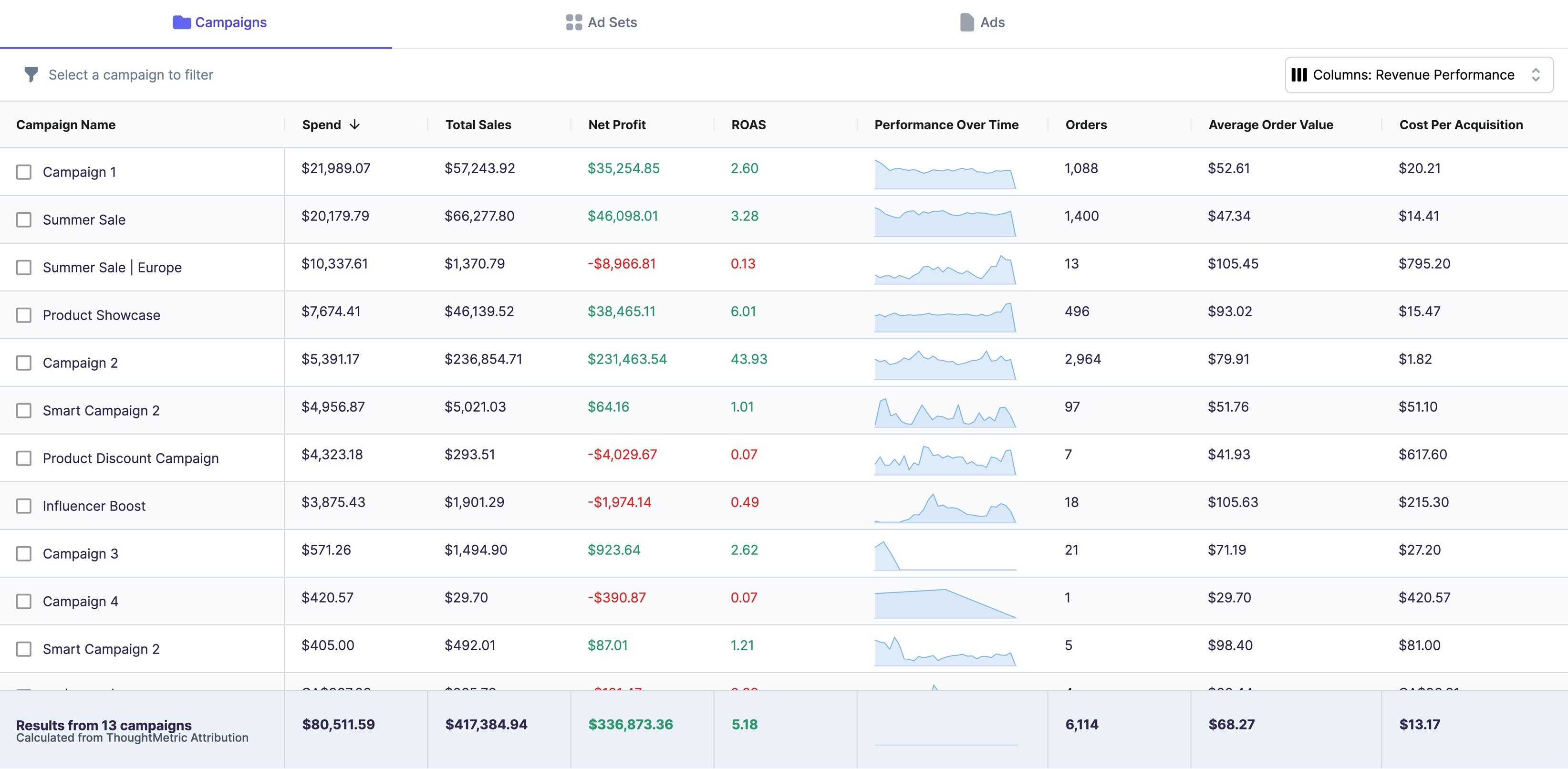While your paid advertising specialists are usually the ones sweating over CAC and ROAS, they’re not the only ones who need answers. From your founder pacing around before a board meeting to the intern drafting a social media post, accurate attribution has a funny way of becoming EVERYONE’S BUSINESS. At the end of the day, many people on the team need an easy way to access the attribution data for different reasons.
So, here it is: a list of 11 people on your team who probably need better attribution more than they realize.
1) Founder / CEO
Attribution helps them do exactly that, without needing five different reports and a migraine.
Early Stage (pre-seed to seed):
You’re testing product-market fit, running ad experiments, and launching your 4th Shopify theme in 2 months. Attribution tells you what’s driving sales and what’s just draining cash.
Founder Thought: “Should we be doing more TikTok or was that one post just lucky?”
Growth Stage (Series A–B):
You’ve got real traction, now it’s time to scale. Scaling without visibility is expensive. Attribution helps you back up your strategy with actual revenue data.
- Justify increasing budget on what’s working
- Cut spend from channels that are underperforming
Now you're managing teams, agencies, and a dozen internal dashboards. Attribution becomes the source of truth that everyone can drive forward.
- Get alignment across teams and vendors
- Standardize reporting so leadership meetings don’t turn into finger-pointing contests
- Make strategic decisions rooted in data, not gut feelings
Founder Thought: “Is it time to hire a growth team?”
2) CMO / VP / Director / Head of Marketing
Your real job? Prove that you're hitting the numbers. 🙂
You’re juggling campaigns, performance goals, creative, and a team that keeps asking for new tools. Every quarter, you’ve got to justify what’s working, what’s worth funding, and what needs to go.
Attribution gives you the receipts to back up your strategy.
Why attribution matters for marketing leadership:
- Quickly see which channels are pulling their weight (and which are along for the ride)
- Cut through the noise and align the team around performance
- Make the case for more budget with confidence, not just vibes
- Guide team structure and hiring based on what’s truly driving growth
- A clean, reliable source of truth for marketing performance
- The ability to switch between high-level trends and campaign-level insights
- A platform the whole team can use
Head of Marketing Thought: "All I want is to cut the stuff that doesn’t work without accidentally killing what does."
3) Agency Partner
Attribution is your best friend, and your chance to finally say, “We told you it was working.”
Why attribution matters for agency partners:
- Show real revenue impact—not just platform-reported results
- Prove which campaigns and creatives impact revenue
- Separate your performance from the chaos happening on the brand’s backend
- Strengthen your case for scaling (or shifting) budget
- Clean attribution that doesn’t rely on client access to six dashboards
- Something that builds client trust instead of platform confusion
Agency Partner Thought: "If we can’t prove results, it doesn’t matter how well the campaign is performing."
4) E-commerce Manager / Head of DTC
You sit at the intersection of marketing, sales, and ops, which means when something isn’t converting, it lands on your desk. Attribution helps you determine whether the issue is your offer, your ad, or that one broken product page.
Why attribution matters for e-commerce and DTC leads:
- See which channels are driving revenue, not just traffic
- Understand the full customer journey, from ad click to repeat purchase
- Spot hidden high performers (like email or SMS) that don’t get enough credit
E-commerce Thought: “Are people buying because of the ad, the landing page, or the promo we forgot to turn off?”
5) Creative Director / Content Strategist
Attribution helps you stop guessing and start creating content that doesn’t just look good, but performs.
Why attribution matters for creative and content teams:
- See which visuals, messages, and formats lead to real purchases
- Connect creative performance to business results—not just engagement
- Learn what resonates with actual buyers, not just people who “liked it”
- Build content strategies that align with what’s converting across platforms
Creative Lead Thought: “So the ugly ad won again. Love that for us.”
6) Consultant / Freelancer
You’re making strategic decisions off of screenshots and Shopify sales spikes. You're somehow still expected to prove you’re worth the retainer. Attribution gives you the insight you need to recommend what works and prove that you’re right.
Why attribution matters for consultants and freelancers:
- Get clarity on what’s driving revenue so you can focus your strategy
- Show clients where they’re wasting money (and how to fix it)
- Prove impact without relying on platform-reported fluff
Consultant Thought: “I can’t fix what I can’t see, and right now, I’m seeing half the picture.”
7) Social Media Manager / Community Manager
Attribution helps you connect the dots between the content you’re pushing and the sales that follow.
Why attribution matters for social and community managers:
- See which posts and platforms drive real conversions, not just likes
- Prove the value of top-of-funnel and brand-building content
- Track how organic, paid, and influencer efforts work together
- Use post-purchase survey data to back up what the metrics don’t show
Social Thought: "We’re growing the brand. Now I want to see where that growth turns into sales."
8) Marketing Analyst / Data Team
Attribution isn’t just another metric, it’s the thing that helps you stop firefighting and finally deliver clear, consistent reporting.
Why attribution matters for data teams and analysts:
- Aligns your ad platform data with what’s happening in the business
- Cuts down on time spent explaining why Meta and Shopify never match
- Centralizes performance data into one trustworthy source
- Makes reporting faster, cleaner, and way less chaotic
Marketing Analyst thought: “If the numbers don’t match, I know I’m about to get five Slack messages.”
9) Lifecycle / Email Marketing Manager
Your job isn’t just retention, it’s revenue. When credit gets handed out, you need to make sure email and SMS are not left out of the conversation.
Attribution shows how your efforts drive repeat purchases.
- See how email, SMS, and retention flows impact overall revenue
- Understand how your efforts fit into the full customer journey
- Prove that returning customers aren’t just magic, they’re nurtured
- Attribute LTV growth to lifecycle efforts, not just first-click channels
Lifecycle Thought: “We don’t just bring people back, we build long-term value.”
10) Marketing Coordinator / Manager
Attribution helps you stay one step ahead. It brings clarity to the moving parts and gives you quick, reliable data to make smart decisions without waiting on someone else’s report.
- Quickly see which campaigns and channels are driving results
- Align content, creative, and media efforts using real data
- Reduce back-and-forth by giving everyone access to the same insights
- Feel confident when you say, “Yeah, this is working. Here’s the proof.”
Marketing Manager Thought: "Attribution helps me connect the dots, even when I’m juggling a million things."
11) Marketing Intern
Attribution is your secret weapon. It helps you understand how everything connects and gives you insight that many marketers take years to figure out. Mention your knowledge of attribution when you start interviewing for your first full-time marketing role, it will surely leave a lasting impression and set you apart from the competition.
- Learn how campaigns actually drive results, not just how they’re built
- Understand the full customer journey from first click to final purchase
- Explore data in a way that’s visual and intuitive, not spreadsheet overload
- Ask smarter questions and contribute more meaningfully to the team
Intern Thought: "It’s cool to see real results instead of just tasks on a to-do list."




.png)
.png)